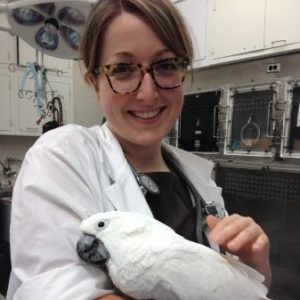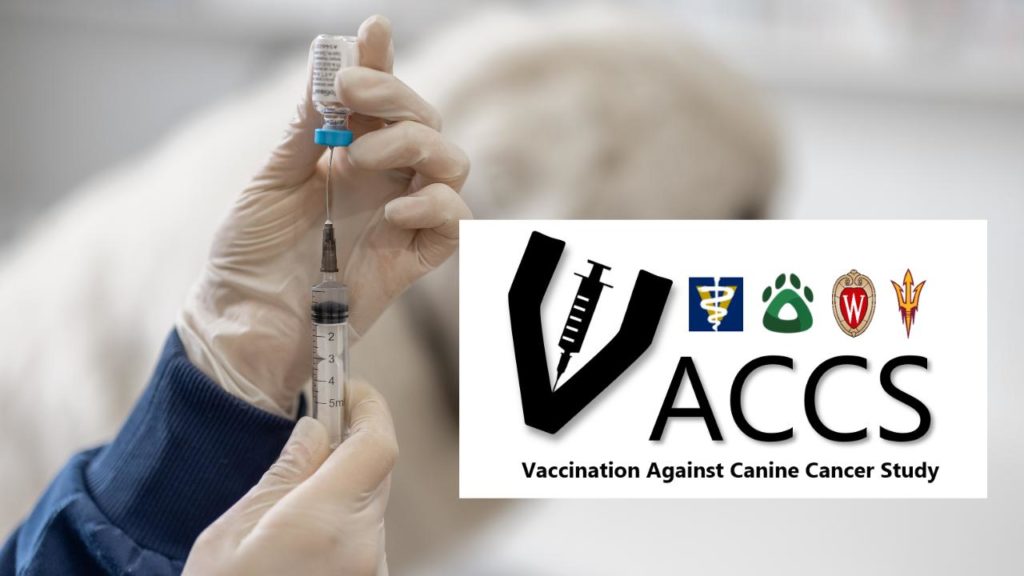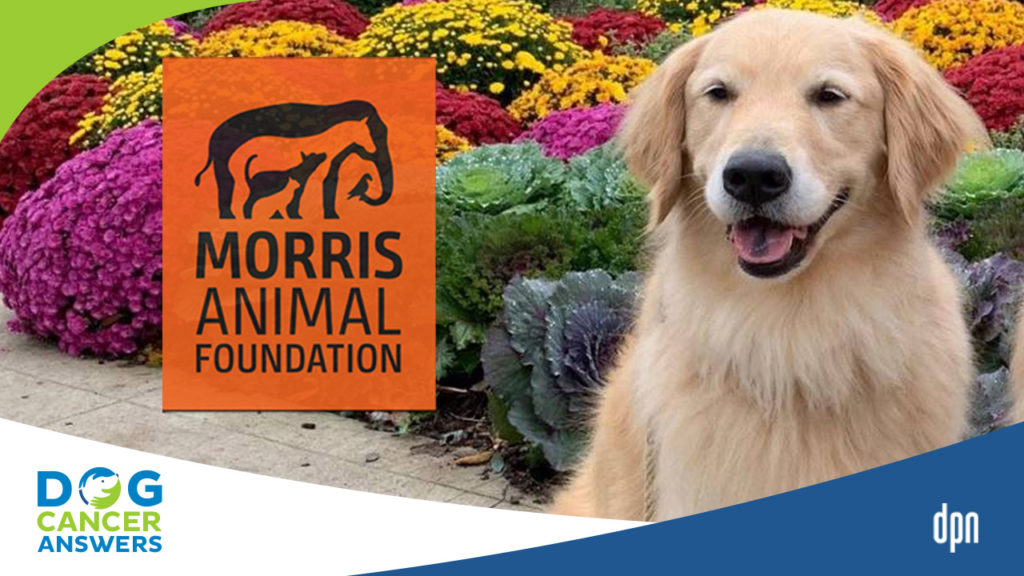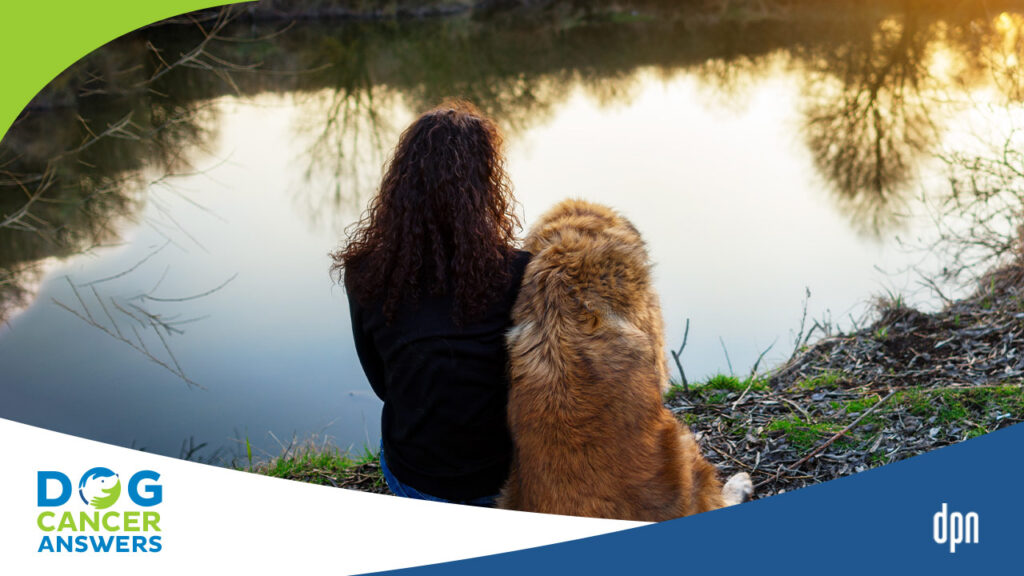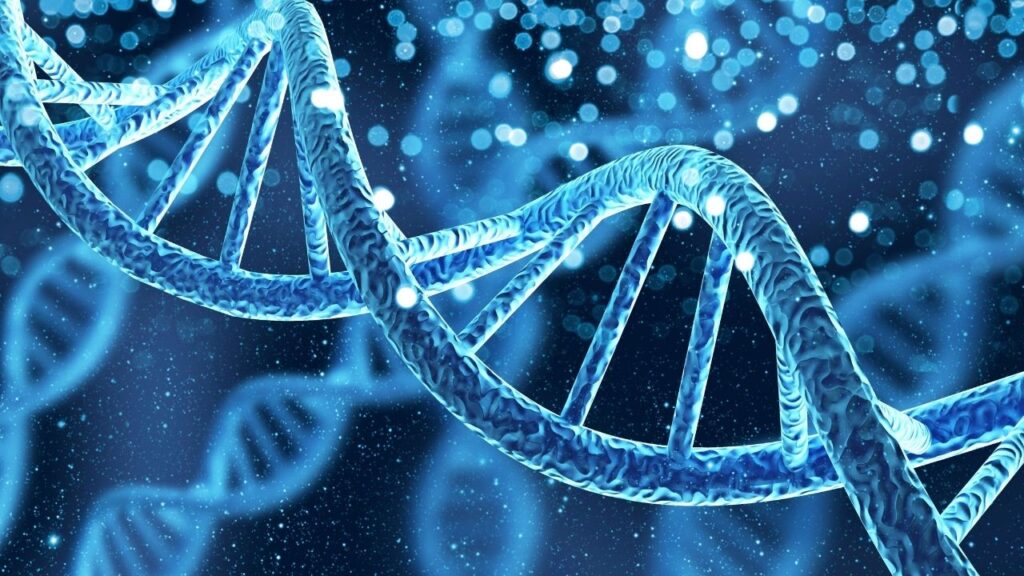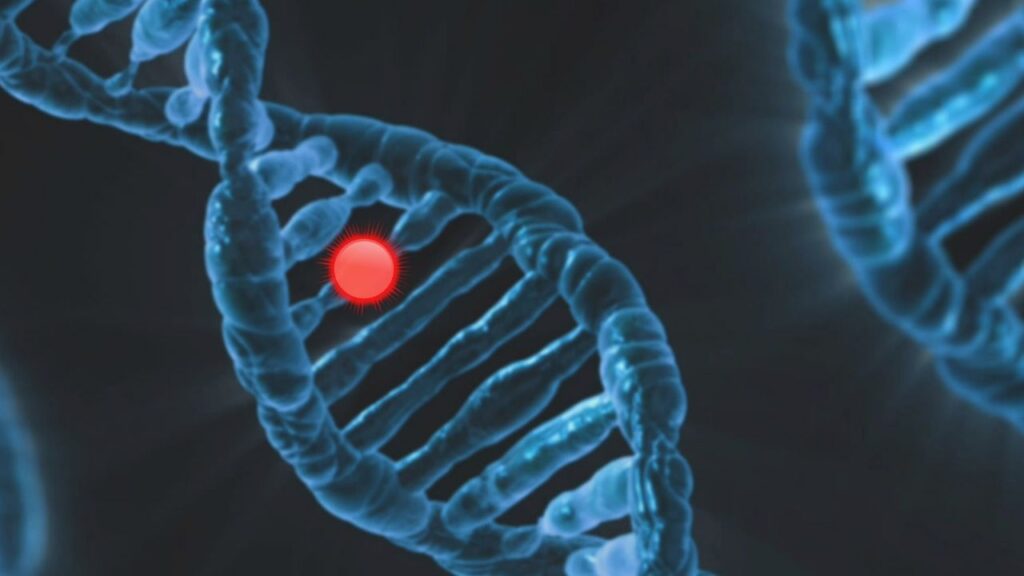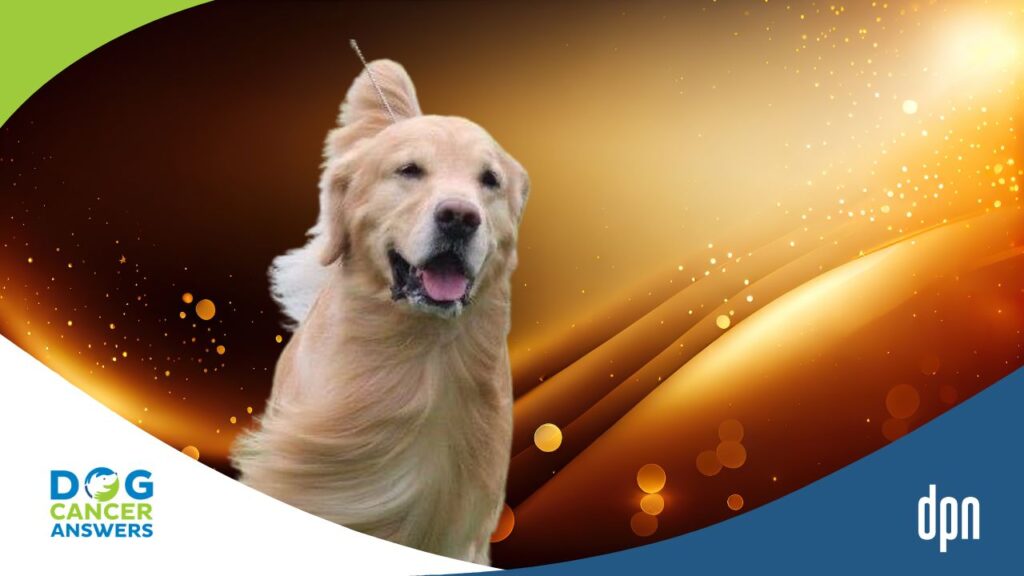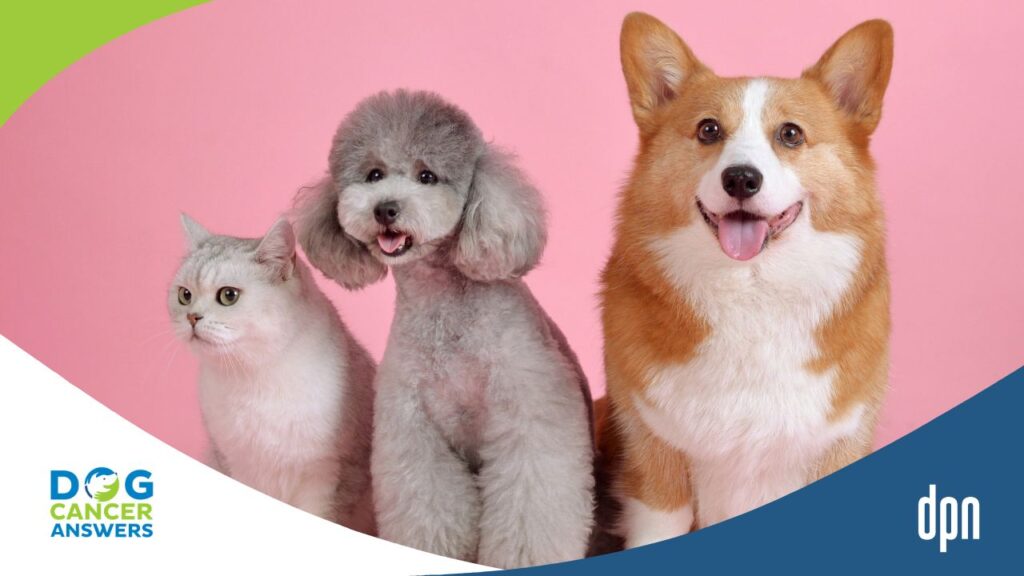EPISODE 172 | RELEASED June 20, 2022
The Darwin’s Ark Cancer Project: How You Can Help | Dr. Michelle White
The Darwin’s Ark Cancer Project is a free, easy way that all of us can contribute to dog cancer research for better prevention, detection, and treatment.
SHOW NOTES
Have a dog with cancer and wish there was something you could do – right now – to help other dogs avoid this disease? Enter Darwin’s Ark.
The Darwin’s Ark Cancer Project is a free, survey-based project that is looking for trends that could pinpoint why some dogs get cancer and why others don’t. Some of the participants will also get a free genome sequencing and/or a silicone tag to help pick up pollutants that your dog is exposed to. Blood samples may also be collected from some dogs to evaluate tumor DNA circulating in the bloodstream.
Listen in to learn more about Darwin’s Ark, how to sign up, and how your dog’s data will be used.
Links Mentioned in Today’s Show:
[00:00:00] >> Dr. Michelle White: There will be this small subset of dogs within the Cancer Project that will get to wear a silicone dog tag. They have found that that material is very good at capturing the exposure that the person has to certain gas based pollutants.
[00:00:19] >> Announcer: Welcome to Dog Cancer Answers, where we help you help your dog with cancer.
[00:00:25] >> Molly Jacobson: Hello friend. Thanks for joining us on Dog Cancer Answers today. We’re gonna be speaking to Dr. Michelle White of the Darwin’s Ark project about how by telling Darwin’s Ark all about your dog today, you might be helping hundreds, thousands, maybe hundreds of thousands of dogs in the future.
Dr. Michelle White, thank you so much for joining us today on Dog Cancer Answers.
[00:00:50] >> Dr. Michelle White: Hi, I’m so happy to be here.
[00:00:51] >> Molly Jacobson: I was reading just yesterday, an article in the AP about how dog breeds and their temperaments do not necessarily, they don’t match up to what our descriptions of them are, what our assumptions of them are and that all dogs are unique.
[00:01:07] >> Dr. Michelle White: That was us. Yeah.
[00:01:08] >> Molly Jacobson: That’s what I thought.
[00:01:09] >> Dr. Michelle White: Yeah. That’s our study from Darwin’s Ark. Yeah.
[00:01:11] >> Molly Jacobson: Yeah. So tell me a little bit about that study.
[00:01:13] >> Dr. Michelle White: Right. So I came in at the very tail end of that work. That’s, you know, six years in the making and lots of people in the lab were involved. Kathleen Morrill is the first author on that. She’s a very brilliant graduate student and she, she and the rest of the team, they used data from, you know, the thousands and thousands of dogs whose owners have joined up with Darwin’s Ark, answered so many surveys about their dogs, and contributed, in many cases, a saliva sample that we were, that they’ll have sequenced to look at some of the genetic variation. And they were able to link the genetic information, the breed reported information.
We are asking the questions sometimes, you know, five, six times in a different way to make sure that we’re actually getting really great survey data that sort of is, validates itself in some ways, just making sure it’s consistent. And then we were able to find that some behavior types were more likely to be associated with breed than others.
Some were more likely to not necessarily be associated with a specific breed, but with certain shared genetic loci, and some were just really not that predictable with either, depending on the breed or depending on what genotypes a dog had inherited, they were more variable than you would expect based on pretty much everyone’s biases of what dog breeds are.
[00:02:27] >> Molly Jacobson: So dogs, it seems, are individuals.
[00:02:31] >> Dr. Michelle White: Yes.
[00:02:32] >> Molly Jacobson: That’s fascinating. So that’s the kind of information though you can only gain through these really in depth detailed surveys that you do at Darwin’s Ark.
[00:02:43] >> Dr. Michelle White: Right. You know, I think such funding that I’ll mention might be easier to get now that the Darwin’s Ark study exists.
But one of the things that has kept veterinary research from advancing like we’d like it to, it’s just, it’s hard to get funding that is dog research for dogs’ sake. There are plenty of studies where dogs serve as a model for something for humans. But when the research involves dogs to help dogs – you know, like researching their behavior, seeing that, what makes them happy, what they’re like – that funding is generally pretty lacking. And what funding is there tends to be small and hard to come by. So we don’t tend to get big numbers when it comes to something that you might think of as more controlled, like a board certified veterinary behaviorist evaluating each dog on these same parameters.
That would be nearly impossible to get the numbers and over the course of six years, like our, our study. So although there’s some inherent messiness with real world answers and surveyed answers – but what happened, you expect that, you know, will be random, you know, when you allow anyone to, there are some biases with who will join, you know, an online community. But I mean, accepting open enrollment for these things, when you get the numbers, it can swamp out a lot of that noise, especially when you’re using validated survey questions and you can get these big numbers and sample, you know, such a larger portion of the country than you could if you were bringing people in to be evaluated by an expert and, and eliminate that noise. So there’s a, a huge trade off in, in what you can accomplish, especially in a veterinary study.
[00:04:15] >> Molly Jacobson: Sure. That’s interesting that there isn’t that much research funding for dogs’ sake. Why you think that is?
[00:04:22] >> Dr. Michelle White: Well, I think-
[00:04:23] >> Molly Jacobson: People just don’t care about dogs.
[00:04:25] >> Dr. Michelle White: Well, they certainly do. People do care about dogs. I think when you care about a dog and you have a dog, you know, I, I’m both a, a veterinarian and a geneticist, and it’s very obvious when you’re a veterinarian that no matter how much you care, the generally out of pocket nature of, of veterinary medicine – you know, very few people have pet insurance.
I think it’s a wonderful idea when people can get pet insurance.
But most people don’t have it. And most people don’t have unlimited funds. So I think there are plenty of people that are interested in the research, it’s just not as, you know, if you think of the government spending tax dollars, that’s not necessarily the first place that the public would want funds to go.
You know, we have plenty of human issues to deal with. And then when it comes to, to privately funded, there are many great animal charities, it’s just they don’t have the same backing that the NIH does, or, you know, some of the big government agencies. And there is funding from the big government agencies, especially in cases where, you know, dogs get similar diseases to, to what humans get. But yeah, like for the dogs for dogs’ sake, it makes sense and it’s sad at the same time.
[00:05:30] >> Molly Jacobson: Yeah, it is. It makes sense, and it’s sad. It’s difficult to rationalize on a, I’m sure on a funder’s level, it’s difficult to say, well, we have all of these human needs and then we have these dog needs and which one helps more.
[00:05:43] >> Dr. Michelle White: Right.
[00:05:43] >> Molly Jacobson: Where’s your money really going? So I’m one of those crazy people who contributed to 23andMe, like within the first six months it was open and it has vastly increased my own understanding of my own health. Would you say that this is a similar program for dogs, or any of these genetic testing services?
[00:06:04] >> Dr. Michelle White: Some of them into – there, there’s a, there’s a few caveats with where we’re at right now in terms of genetics in the canine space, especially that yeah, the consumer testing and the, and the veterinary testing space. So for the same reasons we were just discussing, there aren’t the same, you know, giant studies and longitudinal studies like we had in human medicine, like the, um, the Framingham Heart Project.
It just, we don’t have those same depth of understanding of how genetics impact, especially certain disease related genetic variants that we found. We don’t have the same research behind all of those variants and we also, when we have found something, one of the, the low hanging fruit as it were when we, you know, when we were first doing genetic studies in dogs, it is easier to sort of spot the difference when it comes to why does a control dog have this disease or this risk factor or trait and this dog not – it’s easier to find what the genetic difference is when you do the study in one single breed of dogs, because for the most part, their genetics are very similar and it’s easier to see a variant that might be responsible for what you are interested in to pop out. And so a lot of the knowledge that we have is how does this genetic variant [affect] a dog of this breed.
And we don’t know if, you know, say a mixed breed dog or another breed of dog that has that same variant, how it might play out in a dog that doesn’t have all of the rest of that same, very similar DNA of a breed. So because of that, and because of an additional, you know, lack of regulation, like human medicine and in human consumer testing, has, there are certain things you’re allowed to say and not allowed to say in human medicine. And we don’t have those same rules for the dog consumer testing.
So Darwin’s Ark takes a, a conservative approach when it comes to reporting health data. They don’t report breed ancestry to a participant that has their dog’s, their DNA sequence, but they, um, do not report possible health related variants, whereas-
[00:08:04] >> Molly Jacobson: Okay.
[00:08:04] >> Dr. Michelle White: -there are other companies that, like Embark, like Wisdom Panel, that will share the dog’s genotype.
[00:08:10] >> Molly Jacobson: More medically oriented.
[00:08:11] >> Dr. Michelle White: Right.
And then there are veterinary products or veterinary tests, many are specific for a, a disease of suspicion. Like we are going to test because we suspect this might be related to a genetic disease, and those tend to be performed at universities and, you know. All are performed in high quality labs, it’s just, we don’t have the same exact regulations to know exactly which standards are being met.
[00:08:34] >> Molly Jacobson: Right. So it’s similar in that it, you’re creating a huge database from people who are basically volunteering their dog’s DNA. And even in many cases, I’m assuming that people choose to pay ’cause there’s three tiers, is that what I read?
[00:08:48] >> Dr. Michelle White: Yes.
[00:08:49] >> Molly Jacobson: So if they choose to participate and send in a spit sample and fill out hours and hours worth of surveys, it’s because in the future, hopefully we will be able to bring together all of that data and you guys will be able to make some – building a database to spawn new research and make new studies available and maybe even make some recommendations to individual veterinarians about individual dogs. Is that fair?
[00:09:15] >> Dr. Michelle White: Yes. That’s certainly, uh, something we’d be interested in, in the future. Yeah. That we hope for in the future, to be able to give a heads up for certain, you know, risk factors that, especially those that intervention can change. If you can intervene knowing that there’s a risk factor, yes, those are things that we’d especially hope to do. And then also when it comes to diagnosing. Yeah, of course, the more data we have and the more, we know about these dogs, yes, the easier that becomes for us in the future.
[00:09:40] >> Molly Jacobson: Right. So it’s about collecting data now, knowing that it’s gonna pay off for future dogs.
[00:09:46] >> Dr. Michelle White: Yes. And like the study that just came out. That was made possible by the people that signed up, by the people – so not just the people that had their DNA sequenced, or sorry, the dogs that had their DNA sequenced, but the dogs that, you know, were reported to be a certain breed or, or have a certain ancestry, and we have lots of behavioral surveys on them, they contribute as well. So yeah, everybody participates and some really cool things come out of it.
[00:10:09] >> Molly Jacobson: Yeah. And it seems to me like, well, I’m putting myself in your shoes as a genetics researcher, this must be very exciting to know that the database is growing and you’re gonna learn more and more and more.
[00:10:22] >> Dr. Michelle White: Right.
So the two things that, you know, I love the most are, are veterinary medicine and, and genetics and it’s, yeah. It’s, it’s unbelievable the interest that has spiked, you know, over the last decade or so, um, the resources that have become available. It’s really, really, it’s an exciting time.
[00:10:38] >> Molly Jacobson: Absolutely. I think genetics is hot right now, right? We’re just beginning to udnerstand-
[00:10:43] >> Dr. Michelle White: Yeah.
[00:10:43] >> Molly Jacobson: -how it actually works rather than just sort of saying, oh, it must be genes. It must be genetic. We’re now actually being able to say, it is, and it’s this specific gene. Right?
[00:10:53] >> Dr. Michelle White: Right.
[00:10:54] >> Molly Jacobson: It is very exciting.
[00:10:55] >> Dr. Michelle White: Yes.
[00:10:56] >> Molly Jacobson: So tell me a little bit about, because this is Dog Cancer Answers, tell me a little bit about the Cancer Project.
[00:11:02] >> Dr. Michelle White: Right. So the Cancer Project was, you know, we just, um, launched it. It’s only been, you know, probably a month now that, that the site has been live. But the, the Darwin’s Ark Cancer Project under the Darwin’s Ark umbrella, it’s a project where we are including, where dogs, for owners, for pet parents that have a dog with a cancer diagnosis, whether they’re currently dealing with a cancer diagnosis, whether they’re in remission or, or they’ve been cured, considered cured of cancer, they can enroll in this project, answer some surveys that are specific to the project, but they’re also, once they’re enrolled in the Cancer Project, they’re, you know, part of the Darwin’s Ark community as well. So they could answer all the, the other surveys that we have.
[00:11:40] >> Molly Jacobson: So if our listeners wanted to contribute to the Cancer Project, you would recommend they go ahead and do that and then they’ll be included in the larger pool of genetics testing.
[00:11:52] >> Dr. Michelle White: So the genetics piece is separate somewhat because anyone can, yeah, anyone with a dog can join the, the Darwin’s Ark project, answer the surveys. And so same with the Cancer Project.
[00:12:02] >> Molly Jacobson: Okay.
[00:12:03] >> Dr. Michelle White: You can join, you can, you can answer the surveys and participate in the project. We also have a Facebook group that, where we have some of our, our animal behaviorists and, and some of the scientists to come and discuss the science, discuss supportive, to be supportive of each other because everyone’s dealing with, or has dealt with a cancer diagnosis, and offer support for ways to make life easier for, for the, the people, for the dogs and, you know, provide enrichment, deal with mobility issues, things like that.
And so anyone can participate in that that has a dog that’s eligible. And then yes, if you’d like to, you’re also considered, you’re a part of the Darwin’s Ark project, so yes, you could answer the other surveys as well.
[00:12:42] >> Molly Jacobson: Okay. And once you do that, it’s a richer experience for you as a researcher. You would like people to go ahead and-
[00:12:49] >> Dr. Michelle White: Yeah.
[00:12:49] >> Molly Jacobson: -and fill out those surveys.
[00:12:51] >> Dr. Michelle White: Yeah. It tells us a lot. The cancer specific surveys, we’re trying to gather lots of, of lifestyle related information. We know that, you know, some cancer risk, we see it pocketed throughout the country in people, and sometimes it, certain cancers have been associated with certain, you know, air quality differences, with certain, presence of certain, you know, chemicals or traffic, for example.
[00:13:12] >> Molly Jacobson: There’s environmental risks that are localized.
[00:13:14] >> Dr. Michelle White: Yes.
[00:13:14] >> Molly Jacobson: Where, yeah, we know, like there are certain known carcinogens that are concentrated in an area for whatever reason, there’s many.
[00:13:21] >> Dr. Michelle White: Right. And even, you know, levels of sun so yeah, whether people are exposed to, to UV. So we gather lots of lifestyle information on the dogs, and we also, you know, ask for certain exposures that might occur outside or inside the home. We’re partnering with, with Oregon State scientists who are experts in environmental toxicology and, and passive sampling.
And what passive sampling means, it’s basically, in our case, there will be this small subset of dogs within the Cancer Project that will get to wear, um, a silicone dog tag. And this is based on a discovery that when everyone was wearing, you know, the Livestrong bracelets and the, the silicone, they have found that that material is very good at capturing the exposure that the person has to certain gas based pollutants.
So that can include certain, you know, pesticides or related compounds, certain combustion byproducts, things like that.
[00:14:15] >> Molly Jacobson: What? That’s amazing.
[00:14:16] >> Dr. Michelle White: Yes. So the scientists at Oregon State, they looked at these dog tags. Well, they were cat tags in the study that I’m mentioning, where cats wore on their collars a little silicone tag. And they found by studying cats that were diagnosed with hyperthyroidism versus cats that were not, this is a, a common disease where cats, their thyroid grows sort of out of control and their, their metabolism goes way up and they tend to get very thin before you realize what’s going on.
[00:14:44] >> Molly Jacobson: Right.
[00:14:44] >> Dr. Michelle White: You know, without treatment, the cat can just waste away.
[00:14:46] >> Molly Jacobson: Right.
[00:14:47] >> Dr. Michelle White: Yeah. If you don’t catch this. So what they found with the passive samplers, they were able to find a certain flame retardant that cats were exposed to, were more likely to be exposed to if they were in the hyperthyroid group. And-
[00:14:57] >> Molly Jacobson: My word.
[00:14:58] >> Dr. Michelle White: Yeah.
So these sorts of things make sense because our cats are, you know, always stumbling on our furniture. And you know, there are certain chemicals that we’ve used on products where your cat might actually be more of a sentinel than you, because they tend to, you know, stay at home. They don’t go to work, and they’re dealing with these things all the time.
So we are going to have a subset of dogs wear these tags and they’ll be spread, you know, throughout the country. And we’re gonna see what we pick up in an initial pilot sampling, and then we’re going to see what we find and narrow down what we’re looking for and sample more dogs to see if we find similar patterns elsewhere.
[00:15:33] >> Molly Jacobson: If that works out, do you think someday when you sign up for Darwin’s Ark and you join, you’re gonna get yourself a silicone dog tag for your dog. Wouldn’t that be amazing?
[00:15:43] >> Dr. Michelle White: Yeah. If we could get to the point where, yeah, so we can prove that this is useful enough where we could do that, that would be wonderful.
[00:15:49] >> Molly Jacobson: Amazing. Because of course, whatever the cat or the dog is being exposed to, this all goes to human medicine as well. It could profoundly change-
[00:15:59] >> Dr. Michelle White: Yeah. In North Carolina State, there was a study that did match up silicone dog tags and human bracelets so that they were partnered and they, they did show a big correlation between what the human was exposed to and their dog.
[00:16:11] >> Molly Jacobson: Wow. So is that something you get to choose or is that something you guys are gonna decide on the, on the back end, as they say, about which dog gets a tag?
[00:16:19] >> Dr. Michelle White: We’re gonna try to maximize, you know, finding something actionable. We’re not sure exactly how we’re gonna try to distribute those samples, so it’s not clear at this point because we don’t have all the information we need.
[00:16:29] >> Molly Jacobson: You haven’t collected all the data.
[00:16:31] >> Dr. Michelle White: Yeah. And we’re not just interested in what the tags say, we’re interested in how the findings from the tags correlate to the surveys as well, because since everyone’s not gonna get a tag, what the tags tell us about how accurate or, certain biases might be in the survey data that can actually help us use this survey data more effectively in using them as a proxy for what the tags show us.
So there’s a lot of factors to consider when it comes to using the tags and linking them up with what we see in the surveys.
[00:16:59] >> Molly Jacobson: In your Twitter bio, you call yourself a genetics nerd.
[00:17:03] >> Dr. Michelle White: Yeah.
[00:17:04] >> Molly Jacobson: And I can see how exciting this is for you.
[00:17:08] >> Dr. Michelle White: Yes. I had always wanted to be a veterinarian and I, you know, when I showed up at college, I, you know, had that laser focus of how to get those requirements met and you know, get on my way to being a veterinarian.
And I took my first, my freshman genetics course. My professor’s name is, is Dan Hardell, and I, yeah, really geeked out. It was one of those things where you know that you sort of lost connection with how other people feel, because it’s hard for me to remember that other people might not think this is that exciting.
Like it, it’s just, it’s hard for me to empathize with people, yeah, who are not thinking this is ridiculously cool, these things that he’s saying, this, like this class, like is amazing, like, right? I mean, he’s, he’s a very well respected scientist. So I think, you know, there’s a bias that many people think what Dan Hardell does is cool, but I was very confused about what am I gonna do, ’cause you know, at the time there wasn’t a, besides, you know, breeding or, you know, the, the genetics that they were still a big deal in like the, the seeing eye dog breeding community, things like that, there just wasn’t a place I could see myself doing both. And now it’s obvious. But yeah, I could not picture which job I was gonna do for, for quite some time.
[00:18:19] >> Molly Jacobson: Veterinarian or geneticist. And then you found a way to do both.
[00:18:24] >> Dr. Michelle White: Yes, Dr. Karlsson’s lab, and she’s the, you know, the head scientist that founded Darwin’s Ark.
It really is like that place, there, there are several DVM PhDs, you know, clinician scientists that, you know, have worked with Elinor in addition to many other diverse scientists. And it it’s like a dream team because I really get to use both, sort of both sides of myself in my work, because it is very important to know about health, about how the body works, about how animals’ bodies work, but also to know what to look for and which genetic variants, what they can do, what that might look like, and how to find out how they might be related to what we see in the clinic.
[00:19:01] >> Molly Jacobson: So do you feel like you’re on the, on the leading edge of veterinary understanding, that clinicians a year to 10 years from now are going to be taught what you’re learning now, people who graduate 10 years from now are gonna be learning what you are just beginning to understand at Darwin’s Ark?
[00:19:19] >> Dr. Michelle White: Oh, that’s a really good question.
I really hope so.
[00:19:23] >> Molly Jacobson: Well, that’s a good place to take a break. So we’ll be right back with Dr. Michelle White of the Darwin’s Ark project.
So if somebody wanted to join Darwin’s Ark, or specifically the Cancer Project, what’s the procedure? How much does it cost, what’s the involvement that you have, like walk us through the project.
[00:19:48] >> Dr. Michelle White: So they can go to darwinsark.org.
[00:19:50] >> Molly Jacobson: We’ll make sure that the links are in the show notes.
[00:19:53] >> Dr. Michelle White: Yeah. Okay. And then basically there are some enrollment forms that you, that you sign just to make sure that you understand what the research is for and agree to have your dog as part of the project.
And then basically you’ll get this My Laboratory will open up, and like your homepage within the, the Darwin’s Ark project.
[00:20:09] >> Molly Jacobson: Okay.
[00:20:09] >> Dr. Michelle White: And you will enter your dog’s information, your information. There’ll be some breeds or you can enter if you know a predominant mix, or you can choose multiple breeds. Age, things like that. Some of the basic stats of your dog, and your dog’s name, you can upload a photo if you like, and then you can choose to go on to the surveys, but there’s also an option to enroll in the, the Darwin’s Ark Cancer Project.
And I should mention that, of course, there are people that are just finding out about the Cancer Project or those that, you know, were dealing with a, a dog with cancer, and unfortunately we know a lot of dogs pass away. And I do get questions about, you know, if my dog has recently passed away, can I join, you know, on their behalf? And we are allowing dogs that have passed within the past calendar year. They are still eligible to-
[00:20:54] >> Molly Jacobson: Oh, really?
[00:20:55] >> Dr. Michelle White: -sign up for, for Darwin’s Ark Cancer Project. We have to limit the amount of time that’s passed based on, you know, parameters that affect survey.
[00:21:02] >> Molly Jacobson: You wanna make sure that people are-
[00:21:03] >> Dr. Michelle White: You don’t want too much time to pass.
[00:21:04] >> Molly Jacobson: Right. They still remember accurately.
[00:21:06] >> Dr. Michelle White: Yeah.
[00:21:07] >> Molly Jacobson: All of the little things.
[00:21:08] >> Dr. Michelle White: Right. And we’re sorry for that. We don’t mean to say that people will forget, but it’s part of, you know, keeping certain standards to make sure our data is, is standardized in some way.
So I believe they will be able to answer the surveys for the Cancer Project. I don’t believe that dogs that have passed away, I don’t think the other Darwin’s Ark surveys will be available to them, but you would still be able to fill out the cancer specific surveys.
[00:21:30] >> Molly Jacobson: Wonderful. So people can contribute even if – you know, a lot of people when their dogs pass from cancer, especially, I hear every day people say, I wanna give back. I wanna help dogs in the future.
[00:21:44] >> Dr. Michelle White: Yes.
[00:21:44] >> Molly Jacobson: Like dog lovers are a breed apart, we like to say, at Dog Podcast Network.
[00:21:48] >> Dr. Michelle White: Yeah.
[00:21:49] >> Molly Jacobson: And they really like to help dogs. And so this is wonderful that you’re allowing them to participate in some way, even if the worst has passed.
[00:22:00] >> Dr. Michelle White: And there’s another part of the study that I, I forgot to mention. There are other dogs that may be selected to have a, a kit sent to them where we will be including a, a blood draw tube for those dogs. So when they’re going to their veterinarian or their oncologist, it can basically be added on and drawn at the same time as their other blood work.
So we’re asking, since we don’t have the options available to us, like Quest Diagnostics, we’re going to be relying on the, on a courtesy draw from the, the veterinarian. So hopefully, um, if we can add this to, in the dog’s regular appointment, then those dogs that are participating in this study, there’s an included box and packaging and FedEx label that can then just be sent back to us.
And for that, we’re looking to get circulating tumor DNA, which is DNA that exists in the blood from tumor cells that have ruptured and released their contents into the blood. And that tends to happen because cancer is quickly growing. We tend to see it’s released often enough in the blood where we can usually pick that up, especially with certain cancers that tend to, to have more yield of this DNA.
We are gonna be taking that DNA, sequencing it, and looking to both advance this, it’s a much less invasive technology, an emerging technology. It’s less invasive than taking a biopsy. And it also, it tells us many of the same things that we would get from sequencing a, an actual tumor biopsy, but it also can tell us some things that we couldn’t tell from a tumor biopsy, which is sometimes we see mutations that were not in the original tumor, but they might belong to a distant metastases or a, a tumor that’s, you know, a secondary tumor that is located in some place that we couldn’t easily biopsy.
So, because it’s a less invasive technology, there are so many more potential applications for multiple repeat sampling, monitoring cancer response to surgery or, or chemotherapy. And also in the future, trying to pick up recurrence or a relapse before we actually see something on imaging or the dog appears sick.
If we can catch it sooner by doing repeat sampling in the future, because we know exactly which, which variants are common or even specific variants to an individual dog, if we get there, or that’s something that people can afford and we can make it work, then maybe we can catch relapse sooner. And then once we get really good at that, maybe we can be screening dogs and catching multiple cancers before we would otherwise have diagnosed them.
[00:24:17] >> Molly Jacobson: Right. Because too often we catch it too late.
[00:24:20] >> Dr. Michelle White: Yes.
[00:24:20] >> Molly Jacobson: So that’s really interesting. So when someone joins Darwin’s Ark, sets up, says I wanna be part of the Cancer Project, then you guys will look at everything else that they’ve submitted and then decide whether or not to send out that sample kit, which they can take to their veterinarian for a really quick, easy blood draw. The veterinarian ships it off via the enclosed packaging. They don’t have to take it to the-* *
[00:24:44] >> Dr. Michelle White: They can. They can just hand the tube back and.
[00:24:46] >> Molly Jacobson: That’s great.
[00:24:46] >> Dr. Michelle White: Right. So the vet hands the tube back, we’ve got the packaging all ready to go and they can just drop it in a FedEx box.
[00:24:51] >> Molly Jacobson: Oh, that’s wonderful. And then if you wanted to do a follow up, you would send them another tube later.
[00:24:57] >> Dr. Michelle White: In this study, we won’t. We’ll be taking one sample maximum. Yeah. For those dogs that are selected. But yes in the future, yes, that’s one amazing potential application of the blood biopsy technology.
[00:25:08] >> Molly Jacobson: So for the Cancer Project, you are also, in some cases, not all, testing the tumor’s genetics.
[00:25:15] >> Dr. Michelle White: Right.
[00:25:15] >> Molly Jacobson: But otherwise you’re focused just on the dog’s genetics.
[00:25:18] >> Dr. Michelle White: Yeah.
[00:25:19] >> Molly Jacobson: Okay.
[00:25:19] >> Dr. Michelle White: And not the tumor biopsy, but yes, the circulating tumor DNA. So yes, in a certain subset of cases, and that is separate from what you would get from a salivary swab, which for the most part should not contain any tumor DNA, but would be the, the DNA that the dog is born with.
Yes.
[00:25:33] >> Molly Jacobson: Right, ’cause there’s the dog’s genetics and there’s the tumor’s genetics.
[00:25:37] >> Dr. Michelle White: Right.
[00:25:37] >> Molly Jacobson: Okay. So in general, when people are joining Darwin’s Ark, they’re getting their dog’s genetics tested.
[00:25:43] >> Dr. Michelle White: Yes. If they qualify for a swab or they, or they paid to have a, a swab analyzed, you know, ahead of the time funding would allow, then yes. They’re analyzing their, their dogs, uh, what we call germline DNA or the, the DNA you’re born with.
[00:25:55] >> Molly Jacobson: Not a tumor that’s popped up.
[00:25:57] >> Dr. Michelle White: Yeah.
[00:25:57] >> Molly Jacobson: So how much does it cost if you want to skip – ’cause it, my understanding is there’s a wait list.
[00:26:02] >> Dr. Michelle White: Yes.
[00:26:02] >> Molly Jacobson: And you can skip to the head if you are willing to make a donation, willing and able to make a donation to the project so that it can get funded.
[00:26:10] >> Dr. Michelle White: The costs are updated as sequence technology prices change. There are three levels. One to, to get the kit early for what we call low pass sequencing, then there’s sort of a, a Cadillac sequencing, what we call our trailblazer dogs, you know, with the second level where, where you’re paying to get a swab early, you can find out things like breed ancestry.
But our trailblazer samples, those dogs not only do we get a better idea of all of the variation within, not just the breed ancestry specific, but they also can serve as very important foundational members of genetic research because we have, we sequence them at a high depth that tells us very confidently what variation they, they have in their genome.
[00:26:49] >> Molly Jacobson: I see. So if you wait, and if you’re on the wait list and you don’t pay, do you get that, how did you put it, the lower level, the first bypass?
[00:27:00] >> Dr. Michelle White: We call that low pass sequencing. It’s basically sequencing that’s not as, um.
[00:27:04] >> Molly Jacobson: It’s not as in depth.
[00:27:05] >> Dr. Michelle White: Yes. It’s not as in depth. So, if you fill out all your, I think it’s at least 10 surveys in the normal Darwin’s Ark project to qualify, for when funding allows, we’ll send you a swab and you’ll be on the, the wait list for the low pass sequencing. If your dog is up, like from the wait list, you can get your dog’s breed ancestry report, and then there’s something separate, if you pay for the in-depth sequencing, you get a, you know, a more detailed report.
[00:27:27] >> Molly Jacobson: Okay.
[00:27:28] >> Dr. Michelle White: But even if you do not pay, yeah, if you’re up for a swab and your, your dog, you know, it may take a, it’s an indefinite amount of time, depending on when we get funding that your dog based on the surveys or based on whatever a certain grant is looking for, we don’t exactly know when your sample might get sequenced.
[00:27:44] >> Molly Jacobson: I see.
So you, you have this large pool of, of dogs that you could sequence. You’ve got all of their surveys filled out. All of these accounts set up.
[00:27:51] >> Dr. Michelle White: Yes.
[00:27:51] >> Molly Jacobson: People who are willing to participate. And then your funders are earmarking certain funds, in some cases, for certain projects and you guys can go look at your pool and say, oh look, we have a hundred dogs that would actually be a really good inclusion in this particular funding grant, so that money can pay for those sequences.
[00:28:11] >> Dr. Michelle White: Exactly.
[00:28:12] >> Molly Jacobson: I see. That’s wonderful. So what we want is for people to give money for general purpose sequencing so everybody can get their sequences.
[00:28:21] >> Dr. Michelle White: Yeah. Or, you know, and certainly if you think, as more people participate, then we see more trends that are interesting. So it might not even be multipurpose. It might be just that, you know, the more sequences we have, the more we start to see that something’s different over here, or, you know, dogs that have this quality seem to have something else in common, right? The more data you have, the more questions pop up. It’s just, it’s always-
[00:28:44] >> Molly Jacobson: Yeah.
[00:28:44] >> Dr. Michelle White: Yeah. It never ends.
[00:28:46] >> Molly Jacobson: Wonderful. So I wanted to ask you, who runs Darwin’s Ark? It looks like there’s a lot of people involved, but who’s behind the magic?
[00:28:54] >> Dr. Michelle White: Right. So Elinor Karlsson, Dr. Elinor Karlsson, is the founder and the, the chief scientist. So she runs our lab. She runs Darwin’s Ark, and she, she studies genetics of all vertebrate species. Um, so she has a very diverse portfolio of projects, but she has a lot of her work focuses on dogs. And one of the big reasons for that is she noticed that people are so happy to share information about their dogs.
They mean so much to them. They wanna know more about them. So this inspired her to turn this into a community science project, because there was just so much data that people wanted to share. It wasn’t going to be like pulling teeth.
[00:29:38] >> Molly Jacobson: Go to any dog park and you’ll have people.
[00:29:41] >> Dr. Michelle White: Right.
[00:29:41] >> Molly Jacobson: Just tell you about their dog.
[00:29:42] >> Dr. Michelle White: Yeah. And then the executive director is Charlie Lieu. She runs a lot of the, the nuts and bolts of Darwin’s Ark. She has a history of working for the good of science in the community. So she runs a lot of the day to day operations of, of Darwin’s Ark. And then there are a lot, so many collaborators, advisors. One of the big ones for us with the Cancer Project is Marjie Alonzo. She is the head of the, the International Association of Animal Behavior Consultants Foundation.
So she is a, a wonderful behaviorist and, and trainer of dogs. And she helps us communicate with dog owners, helps us give support to owners that are in the project, and think of ways to enrich their dogs’ lives even when they might not be able to do everything after their cancer diagnosis that they love to do, or they might not wanna do it as intensely. So she’s a huge asset to us and runs the Facebook page that you can join if you’re a part of the Darwin’s Ark Cancer Project.
[00:30:41] >> Molly Jacobson: Oh, I see. So you can get a lot of those life quality boosts ideas from her.
[00:30:46] >> Dr. Michelle White: Yeah. And then there are many people within Elinor’s lab that work on the project. So, so many of the graduate students in the scientists within Elinor’s lab, including me, we work with this data and we help facilitate, you know, the studies that come out of the community science and genetic data.
[00:31:01] >> Molly Jacobson: Wonderful.
Something else I wanted to ask about, ’cause I know this is a concern for some people, privacy. Who has access to the data that you’re collecting from dog lovers?
[00:31:13] >> Dr. Michelle White: So we, um, contributing to the scientific community and having, freely sharing the de-personalized data. So yeah, we won’t be sharing any personalized data or data that’s identifying to the owner or the dog, you know, we can be identified by, you know, our dog’s names as well.
[00:31:30] >> Molly Jacobson: Is it that the genetic information might be shared, but it’ll be stripped of, like, if I register my dog Kanga, you’re not gonna tell people Molly Jacobson and Kanga, but you might say 13 year old Maltese, has cancer.
[00:31:45] >> Dr. Michelle White: Yeah.
[00:31:46] >> Molly Jacobson: Okay.
[00:31:46] >> Dr. Michelle White: Yeah, there is this Maltese with these certain genetic variants that we will contribute to other canine health oriented projects and make available on public repositories for people that want to do analyses that include certain dogs, or all dogs, or like if we have what we call phenotypic information.
So yeah, nothing personalized, but some of the, the de-personalized information we will make available to other researchers after our study so that that information that is given to us makes the most impact it can for, for the scientific community and, and the health community.
[00:32:20] >> Molly Jacobson: Did I understand just now that there’s open source repositories?
So this information, once you’ve worked with it, will move into – obviously de-personalized – but it will move into open source repositories so that maybe a researcher who’s, I don’t know, in school five years from now, might be able to use that information for their own projects?
[00:32:41] >> Dr. Michelle White: Yeah. And it, sometimes it depends which study funded it or where the studies are published, where that data will end up. But yes, you can access, like the first that comes to mind, the NIH hosts its own archive.
[00:32:52] >> Molly Jacobson: Right.
[00:32:52] >> Dr. Michelle White: Where you will see, you know, this file contains the genetic sequencing results of a dog of this breed. And the study that’s attached to is usually identified and then that dog will have a specific ID and yes, researchers can search by different characteristics or find all the dogs that were included in a certain study.
And they can also download a file that contains certain characteristics of the dog, like the, the sex of the dog, the breed if it’s known, and what the disease status – say the data came from a study we performed on diabetes risk. It might say, um, you know, case or control, things like that. The diagnosis of the dog, things like that. So yes, that data is made available to, to future researchers.
[00:33:33] >> Molly Jacobson: Wonderful. So if I join today, my experience is that I’m gonna learn something more about my pet, who I love dearly, but the future use for that data will be, who knows? It could be exponential in terms of what it could do in the future for other dogs who I may not personally love so much, but I love ’cause I’m a dog lover and I’m obsessed with dogs.
[00:33:57] >> Dr. Michelle White: Yeah. You know, might be, you know, your dog lives to be, you know, 30 years old and you think wow, like, I’m so glad I gave her DNA to the, to Darwin’s Ark because yeah, then you’ll know that, you know, that we will have that, there’s Hey, like there’s this dog 30 years old in our database. You know, maybe we’ll confirm that because that would sound fishy, but you know, that’s great that that data can keep on giving in the future when we find out more about what makes, like the there’s a project that we participate in, that’s that’s a different umbrella project called the Dog Aging Project, that it’s, does similar work that you could also enroll in where we could say, Hey, we have talked to our Dog Aging Project people and, and let them know. And any number of things could come from, from enrolling your dog in the project, which I think is one of the coolest parts.
[00:34:39] >> Molly Jacobson: So other than cancer and aging, are there any other projects that are specific that I could enroll my dog in?
[00:34:46] >> Dr. Michelle White: Not right now, not with Darwin’s Ark. And the Dog Aging Project is a separate project that you can look up on its own. And it’s not part of Darwin’s Ark. We collaborate with them, but they are a separate, um, awesome organization. So, yes, right now we have the large Darwin’s Ark project and just one cancer specific project. There’s also, we partner with, not as a separate enrollment, but there are some allergy projects focus going on and there’s also, we’re hoping in the future to get a cat project going, but we’re not there yet.
So hopefully that will become a thing. We’ll see. Sophie, do you wanna be in the cat project?
[00:35:20] >> Molly Jacobson: Yes, please.
[00:35:20] >> Dr. Michelle White: Maybe. We’ll see. The, swabbing cats is always fun.
[00:35:24] >> Molly Jacobson: I’m sure.
[00:35:25] >> Dr. Michelle White: So yeah, hopefully more will be, be coming in the future, but right now, yeah, the Cancer Project is one of the first major, I think, sort of within its own bubble project under the larger Darwin’s Ark umbrella.
[00:35:36] >> Molly Jacobson: Well, it’s the number one killer of dogs. So that absolutely makes sense that you’d wanna make sure you’re getting on it sooner rather than later.
[00:35:44] >> Dr. Michelle White: Yeah.
[00:35:45] >> Molly Jacobson: Then I wanted to ask you, as a veterinarian and a geneticist, what’s something you know for sure about dog cancer that you wish every dog lover knew?
[00:35:57] >> Dr. Michelle White: Oh, one thing, I wish that owners knew it wasn’t their fault if your dog is diagnosed with cancer. I have the privilege of knowing more now than I did, you know, when I was younger, and I think people tend to think, you know, is it the food that I gave them? Is it, is it their flea medication? Is it-
[00:36:19] >> Molly Jacobson: Yeah.
[00:36:19] >> Dr. Michelle White: I think a lot of people tend to think that it’s-
[00:36:21] >> Molly Jacobson: It’s their fault.
[00:36:22] >> Dr. Michelle White: -their fault.
[00:36:23] >> Molly Jacobson: Yeah.
[00:36:23] >> Dr. Michelle White: And I think, yeah, that would be something that I wish that every owner could forgive themselves and not worry about. We don’t have it all figured out. The more we can tell you, we will, to, to try to prevent cancers, try to, to intervene sooner. Certainly to try to cure them when they happen. But no, I would not want owners to blame themselves.
It’s a, a horrible, cancer’s a horrible thing. But you have enough to deal with. There’s no need for, for self blame.
[00:36:51] >> Molly Jacobson: Agreed. That’s something that we have to remind people of in our work with people who are dealing with dog cancer is that there is no one thing and this is one of the oldest diseases that’s been around for, since the beginning of, you know, of writing, we have people writing about cancer thousands of years ago. So this is not something that is anybody’s fault. It’s it’s part of being alive in a weird way.
[00:37:16] >> Dr. Michelle White: Yes, unfortunately.
[00:37:17] >> Molly Jacobson: Well, Dr. Michelle White, thank you so much for being with us here today.
[00:37:22] >> Dr. Michelle White: Yeah. Thank you so much for having me. I’ve had a great time.
[00:37:26] >> Molly Jacobson: And thank you listener for joining us today.
If you’ve already contributed to Darwin’s Ark, we really wanna hear from you. Please call our Listener Line at (808) 868-3200, and let us know your own experience. Also, don’t forget to join us on Facebook in our Dog Cancer Support group, and follow us on all the socials, of course. Subscribe to this podcast in your podcast app of choice so that you can never miss a future episode, and give your dog a cuddle from all of us here.
I’m Molly Jacobson, and from all of us here at Dog Podcast Network, I’m wishing you and your dog a very warm, Aloha.
[00:38:14] >> Announcer: Thank you for listening to Dog Cancer Answers. If you’d like to connect, please visit our website at dogcanceranswers.com or call our Listener Line at (808) 868-3200. And here’s a friendly reminder that you probably already know: this podcast is provided for informational and educational purposes only. It’s not meant to take the place of the advice you receive from your dog’s veterinarian.
Only veterinarians who examine your dog can give you veterinary advice or diagnose your dog’s medical condition. Your reliance on the information you hear on this podcast is solely at your own risk. If your dog has a specific health problem, contact your veterinarian. Also, please keep in mind that veterinary information can change rapidly, therefore, some information may be out of date.
Dog Cancer Answers is a presentation of Maui Media in association with Dog Podcast Network.
Hosted By
SUBSCRIBE ON YOUR FAVORITE PLATFORM
Topics
Editor's Picks
CATEGORY
